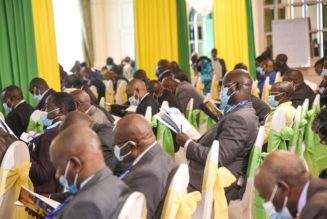Performing Arts
UK author captures life of Ghetto Classics musicians
Friday March 17 2023
Ghetto Classics with U.S First Lady Dr Jill Biden & other guests when the orchestra performed during her visit to Kenya last month. FILE PHOTO | POOL
There are very few musicians in the world who have had the privilege to play privately for former US President Barack Obama.
So, when Tracy Akinyi Ogutu, a clarinettist who was among six musicians from the Ghetto Classics orchestra that performed for Mr Obama during his last visit to Kenya in 2018, told her friends about it, they mocked her: “You have been watching too many movies.”
That rare opportunity was captured in a photograph that hangs on the wall of the Ghetto Classics office at St John’s in Korogocho, Nairobi with Mr Obama facing the musicians whose backs are turned to the camera. Tracy jokingly calls it the “butt photo.”
Such stories of how a music project has transformed the lives of a generation of youth living in squalor on the edge of Nairobi’s largest garbage dump are revealed in a new book Ghetto Classics: How A Youth Orchestra Changed a Nairobi Slum launched in Nairobi last week.
It has taken Ginanne Brownell, a London-based writer for the New York Times, six and a half years, nine trips to Kenya, and multiple interviews across three continents to complete the project that started fortuitously.
In August 2016, Ms Brownell was in Nairobi after a trip to Tanzania researching a story about girls’ education when she decided to check out the classical music scene in the city.
She contacted Elizabeth Njoroge, founder of Ghetto Classics (GC), about writing an article on the youth orchestra based at St John’s the community centre, church, and school in Korogocho.
But, as Ms Brownell recalls, even after the New York Times piece was published, there was a deeper story to be told.
The orchestra performs during the launch of Ghetto Classics How a Youth orchestra changed a Nairobi Slum” at the Muthaiga Country Club in Nairobi on 8 March 2023. PHOTO | POOL
“I was sitting with a girlfriend at a café in Noting Hill, London, telling her about my experience at GC and she said, “That’s your book right there because the story has all the things you are passionate about: music, education, development, and empowerment of girls.”
The author weaves the experiences of different characters whose lives vividly illustrate the challenges in a community beset by deprivation, crime, substance abuse, and sexual and gender-based violence.
The teenagers that the author first met at the beginning of her project are now confident, independent, young adults.
Simon Mungai was a 15-year-old who had never touched a musical instrument, but today is a trombonist and third-year medical student at the University of Nairobi.
Celine Akumu has transformed from the 15-year-old ‘tall, graceful, shy girl’ who fell in love with the clarinet, to the confident, if a slightly emotional, young woman who read an excerpt from the book during the launch.
As Ms Njoroge joked during the event at the Muthaiga Country Club last week: “Celine has been to more countries than most people in this room.”
Kevin Obara overcame the trauma of losing six siblings and growing up in a home where his mother brewed and sold illicit drinks, and is now running his own company repairing musical instruments after an apprenticeship in Germany while studying for his university degree.
“I have seen poverty in Jakarta, Mumbai, but Koch [korogocho] with the dumpsite was just a difficult place. The first time you visit Koch feels like a sucker punch in your stomach,” Ms Brownell told the BDLife in Nairobi last weekend.
Ginanne Brownell, author of “Ghetto Classics How a Youth Orchestra Changed a Nairobi Slum”, with the children of Korogocho, Nairobi at a concert on 12 March 2023. PHOTO | POOL
“The juxtaposition of finding children playing classical music in these surroundings is just too striking.”
“It is not just Western classical music, but they are using these classical instruments to play contemporary African songs like Malaika and Hapo Zamani.”
Mr Obama said their style was far beyond his expectations: “When I take Michelle to the opera, I would not hear that music. You guys know how to groove,” he told them after hearing their arrangement of Oliver Mtukudzi’s Todii in 2018.
The Polish composer and conductor JIMEK expanded the musical horizons of the ensemble when he first worked with them in 2017.
The violin does not just have to play Vivaldi and Beethoven, he told them, you can also play Tupac, 50 Cent, and Beyonce.
After that concert, a teary Bob Collymore, then Safaricom CEO, told Ms Njoroge that it was the best classical concert he had ever attended.
“It is not as if the boys and girls were not talented and ambitious; it is just that Liz gave them agency and capacity,” observes Ms Brownell.
“Liz was a conduit for the drive and ambition which was already there, and she provided the impetus for the Koch community using her capacity and network.
Even in crisis moments, there are often humorous anecdotes. Like when Celine could not immediately obtain a passport to travel to Scotland in 2014 because she didn’t have a birth certificate. “Why do you need that?” her mother asked Ms Njoroge. “You can see that she is alive.”
It is incredible how the youth who grew up with a world view confined to Korogocho are now able to tour the world, interact with internationally renowned musicians, and perform for global dignitaries, from President Obama to Pope Francis, and recently, US First Lady Dr Jill Biden.
Benjamin Wamocho the Art of Music, ensemble’s Music Director sums it up: “I believe that what we do here is bigger than me, bigger than Ms Njoroge. It is an idea whose time has come and I think GC will be around a long time after I have gone.”









